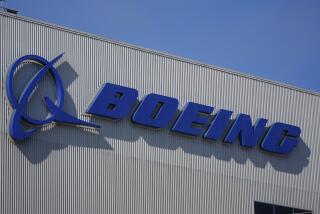Davis Willing to Match Winning Bid for UAL if Deal Collapses
- Share via
Los Angeles investor Marvin Davis, the losing bidder for UAL Corp., parent of United Airlines, said Friday that he stands ready to match the winning $300-a-share bid for the airline if it falls through.
Davis made his backup offer one day after UAL’s outside directors agreed to sell the airline company to a group led by United’s pilots union and Chairman Stephen M. Wolf. The Wolf group’s bid totals $6.75 billion.
The Wolf bid gives 75% of the company to its employees, 10% to management and 15% to British Airways, which is putting up $750 million to help finance the transaction. If completed, the deal would make United the largest American company owned by its employees.
Sources close to Davis said the billionaire investor had not raised his offer sooner because he thought he would lose a bidding war with the Wolf group. Davis reportedly believed that the Wolf group would have been better able to increase its bid because it was financed in part with employee concessions not available to Davis.
In a letter to UAL’s board Friday, Davis said the Wolf group could pay as much as $350 a share with the concessions. Davis said his $300-a-share backup offer did not involve labor concessions.
The sources close to Davis said he thinks that there is a good chance that tensions between United’s unions may sidetrack the buyout. United’s largest union, the International Assn. of Machinists, has said it opposes the bid and might take steps to resist it, possibly including a strike.
Not a ‘Labor Deal’
In addition, these sources said, Davis thinks that old antagonisms between United’s management and pilots might surface and threaten the coalition. The sources pointed out that the transaction gives United’s unions the same number of seats on the board as management, even though labor will own most of the stock.
“This isn’t a labor deal, but a Wolf deal,” a Davis adviser said.
A spokesman for United’s pilots union, however, said the union’s leaders believe that most pilots support the transaction. Jim Damron, the spokesman, said around 70% of United’s pilots contributed to a buyout fund in 1987, when the pilots first tried to take over the airline.
“There is no question about the enthusiasm for this bid,” he said.
Sources close to the bid said they expect the machinists to eventually join the proposed employee stock ownership plan, the vehicle through which United’s employees are receiving a stake in the airline.
These sources said the machinists were concerned that they would not control as much stock as the pilots because their members cannot afford to match the size of the pilots’ wage concessions. However, the machinists would get one of the three labor seats on the board if they participate in the transaction.
“I think the tough words from the machinists are mainly an attempt to get everybody’s attention so they can have a serious discussion about their terms,” said Joseph Blasi, author of several books on employee ownership who has advised the pilots and machinists on the subject.
More to Read
Inside the business of entertainment
The Wide Shot brings you news, analysis and insights on everything from streaming wars to production — and what it all means for the future.
You may occasionally receive promotional content from the Los Angeles Times.










